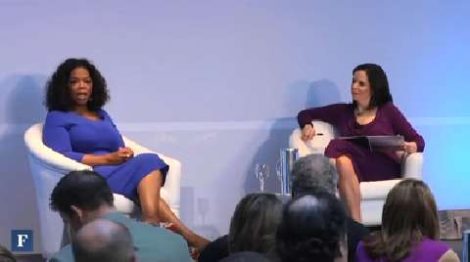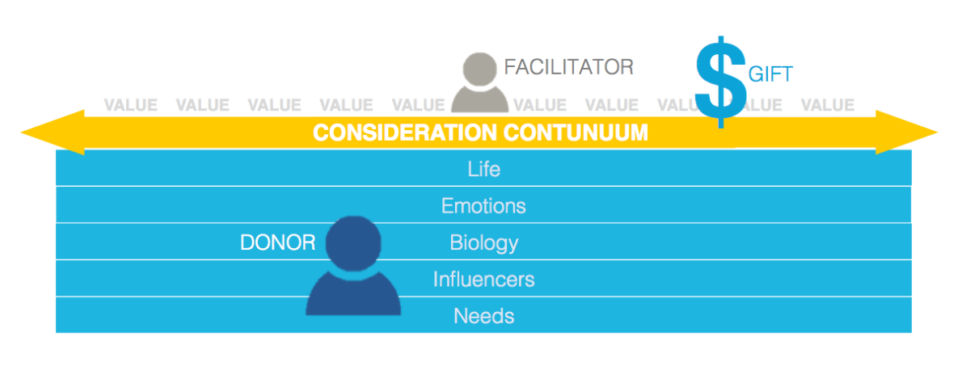
You might have known that Oprah was a philanthropist; but did you know why?
Most people think they know Oprah Winfrey, one of the richest self-made women in the world. Having survived rape and child molestation she became pregnant at the age of 14. Her son died in infancy and she began a career in radio. Now she is a media mogul, talk show host, actress, producer and billionaire. She is also a philanthropist.
In 2012, she was interviewed by Moira Forbes at the Forbes 400 Summit on Philanthropy. There she said, “True philanthropy comes from the heart.” She went on to describe how poor she was growing up. Her grandmother only finished the third grade leading her to believe in education as her road to freedom.
She described the day her mother told her there would be no Christmas presents for her that year. She was sad and embarrassed. Not because she wouldn’t get any presents. Rather, she was worried about what she’d tell her friends when they discussed what they got from Santa Claus.
Here’s when she became a philanthropist (but didn’t know it yet)
Later that night, at around midnight, three nuns showed up at her door carrying baskets of food and toys for her and her half-sister and brother. They handed her a doll.
That’s when she realized that people who didn’t even know her name made sure she had a toy for Christmas. As a result, she felt a sense of relief because now she could tell her friends what she got. But she was also overtaken by a sense of wonder about the fact that people she didn’t even know put forth the time and effort to figure out that her family needed food and toys.
Back to the interview with Moira Forbes
On-stage, with a sincere expression of both gratitude and admiration Oprah went on to say, “I never forgot that moment and years later, when I was contemplating how I wanted to use my own resources, I thought about those nuns. So my first venture was to go to South Africa to do for other children; to create that experience I felt for myself, that sense of wonder that somebody cared about me who didn’t even know my name. I wanted to do that.”
Here’s her WHY
“I also knew what a big role education had played in my life and I always knew from the beginning of my success that I would have to find a way to give back. That’s just part of the way my grandmother raised me; that to those whom much is given, much is expected. She never lived to see how much was given. But I was taught to give back.”
The consideration process
So, next, Oprah expressed her interests in giving back with a focus on education in the media and soon she received an invitation to visit South Africa from Nelson Mandela. She stayed at his home for 10 days and 10 nights and toward the end of the visit, the two of them were sitting together reading the newspaper. By that time the two were very comfortable with one another and they got into a discussion about poverty and how to affect change. She told him her story along with her WHY.
Self-solicitation
Then Oprah proclaimed, “The only way to change poverty is through education and one day, I would like to build a school in South Africa.”
After a brief pause, Nelson Mandella looked at Oprah and said, “You want to build a school?” Then he got up and called the Minister of Education. By that afternoon she was in a meeting talking about getting the project going.
That’s how it works.
Oprah’s impactful giving resulted from 8 major components.
- Her life;
- Her emotions;
- Her biology;
- Her influencers;
- Her needs;
- Her consideration continuum;
- A value proposition;
- And a facilitator (if you are a fundraiser… this is your role).
Let’s review these components and Oprah’s WHY
Oprah’s past life experiences created memories.
When those memories were brought to the fore, she felt emotions.
Then her biology caused the release of certain chemicals in her brain.
The fact that the nuns were charitable to her and that her grandmother taught her to give back influenced her to want to reciprocate by helping others.
She began to realize that giving could provide a way for her personal needs to be met.
Next, she sought out ways to consider how she might become more philanthropic.
Then she evaluated the value she and others would gain from her giving.
And, finally, she took action with a trusted facilitator with whom she built a relationship; on who shared her vision and could help make it a reality.
Your role
Your job is to figure out how to make this happen more often for your organization. But, if you are like most fundraisers, you don’t have enough time or budget.
I promise, by understanding these components of impactful giving and by leveraging technology to provide value at every stage along the consideration continuum, you (the facilitator) can help those hi-capacity supporters (who feel aligned with your organization’s mission) do what Oprah did in support of your cause.

Related Posts:
>>Are You Chasing Wealthy People or Philanthropists?
>>The 8 Core Components of Engagement Fundraising and Why You Desperately Need Them!

Oprah is a master at connecting her abundance with her values – – the good news is that this type of purposeful, thoughtful “fulfillment planning” is available to everyone. Let’s work together to make it happen for our donor-clients!